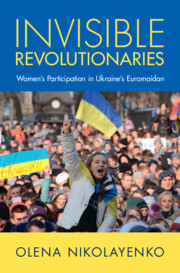Book contents
- Invisible Revolutionaries
- Cambridge Studies in Contentious Politics
- Invisible Revolutionaries
- Copyright page
- Dedication
- Contents
- Figures
- Tables
- Acknowledgments
- Note on Transliteration
- 1 Introduction
- 2 Women’s Activism in a Historical Perspective
- 3 Drivers of Women’s Participation in the Revolution of Dignity
- 4 Women’s Roles During a Revolution
- 5 Gender Outcomes of the Revolution and the Russia–Ukraine War
- 6 Conclusion
- Book part
- Index
3 - Drivers of Women’s Participation in the Revolution of Dignity
Published online by Cambridge University Press: 17 April 2025
- Invisible Revolutionaries
- Cambridge Studies in Contentious Politics
- Invisible Revolutionaries
- Copyright page
- Dedication
- Contents
- Figures
- Tables
- Acknowledgments
- Note on Transliteration
- 1 Introduction
- 2 Women’s Activism in a Historical Perspective
- 3 Drivers of Women’s Participation in the Revolution of Dignity
- 4 Women’s Roles During a Revolution
- 5 Gender Outcomes of the Revolution and the Russia–Ukraine War
- 6 Conclusion
- Book part
- Index
Summary
Consistent with a hybrid model of women’s participation in a revolution, this chapter uncovers a wide range of motivations for women’s engagement in civil resistance, including dissatisfaction with the quality of governance, motherhood, civic duty, professional service, and solidarity with protesters. Specifically, empirical evidence suggests that outrage over police violence and the government’s disregard of human dignity can serve as a catalyst for mass mobilization. This chapter also highlights various mobilizing structures that galvanized women into action, including friendship networks, professional associations, social media, and civic organizations. Moreover, the book contributes to the literature about the impact of biographical availability on protest participation by demonstrating how women might come up with creative solutions to overcome barriers to protest engagement. For example, many women tried to combine their childcare duties with involvement in the revolution by virtue of social media. The empirical findings presented in this chapter speak to a key debate in contentious politics literature on determinants of protest participation.
- Type
- Chapter
- Information
- Invisible RevolutionariesWomen's Participation in Ukraine's Euromaidan, pp. 72 - 101Publisher: Cambridge University PressPrint publication year: 2025

